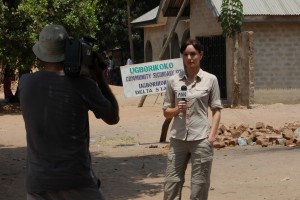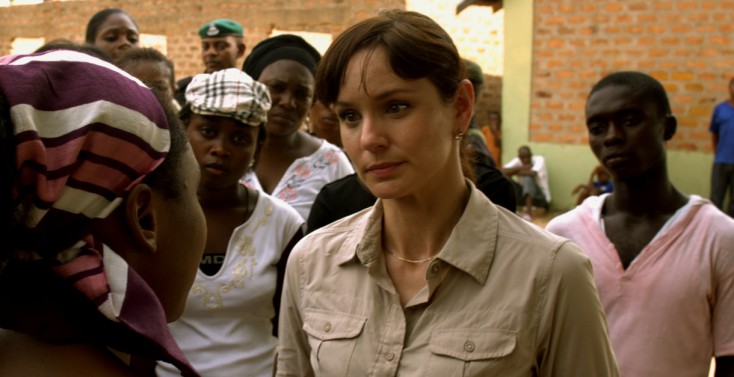
Sarah Wayne Callies as Kate Summers in the dramatic action film “Black November.” ©Entertainment One Films.
By ANGELA DAWSON
Front Row Features
HOLLYWOOD—Former “Walking Dead” actress Sarah Wayne Callies considers herself to be a pretty hardy traveler, having visited refugee camps in Iraq and Jordan as part of her humanitarian work. But nothing could prepare her for shooting on location in rural Nigeria for an indie film called “Black November.”
In it, she plays an American TV news correspondent based in Nigeria covering the region when a volatile, oil-rich local community wages war against their corrupt government and a multi-national oil corporation to protect their land from being destroyed by excessive drilling and spills.
To seek justice, a rebel organization kidnaps an American oil executive (“The Wrestler’s” Mickey Rourke) in Los Angeles and demands that his corporation end the destruction and pollution his company has caused in Nigeria. The even escalates the crisis abroad.
Inspired by true events, “Black November,” is the gripping story of how a community rises up and takes drastic measures to ensure their voices are heard.
Nigerian filmmaker Jeta Amata (“The Amazing Grace”) directed the political drama and wrote the screenplay. In addition to Callies and Rourke, the film stars Anne Heche and Kim Basinger as well as the musicians Akon and Wyclef Jean.[private]
Filmed six years, ago “Black November” is in limited release in theaters as well as available on iTunes and VOD.
Speaking by phone, Callies recalled her adventure making the film and why she wanted to be a part of it.
Q: How did the project come to you and why were you interested?
Callies: It was a strange one, this one. I shot my portion of this on location in Nigeria before “The Walking Dead” ended for me. There was this young, glorified receptionist working at my agent’s office, who got this call from Jeta (Amata). He said, “Hi, I’m calling from Nigeria and I want to ask if Sarah will come over for no money and do this movie that really matters to me.” This kid answering the phone said, “I know Sarah pretty well and I know she has a bleeding heart for things that matter so let me pass your message on to her.” So my agent told me to go to Nigeria. Jeta flew in to Los Angeles later and we sat down and he explained why the film mattered so much to him.
I come from Hawaii, and that’s one of the most important parts of my identity. If my homeland were threatened in the same way that Jeta’s is, I would do whatever I could to tell that story. So I said, “Yeah, sure. What’s next?” Then I went and got my shots and went to a place I’d never been before in my life.
The long and short of it is this is a story that matters so much to Jeta and Mbong (Amata, who plays the protagonist Ebiere), who was his wife at the time, and so many people with whom I worked with while I was in Nigeria. They’re from a region that is the nexus of oil and money and corruption in government, and so I thought the best possible thing I could do was help.
Q: How long were you in Nigeria and had you been there before?
Callies: I’d never been to Africa before, actually. I was supposed to be there for only three weeks. Our film crew ran a little bit ahead of us. We had a mostly Nigerian crew but we also had an amazing Australian camera operator and DP. He showed up with our first AD. They were coming from Los Angeles and they were bringing with them a RED camera film packaging so we could shoot the film. I was traveling on a journalist visa because actor visas don’t exist in Nigeria, at least they didn’t six years ago.
There was a lot of turmoil with (Nigeria’s) president at the time. He was in hiding so when we showed up the Nigerian authorities assumed we were journalists trying to sneak into the country without permission to cover the political unrest so they confiscated our camera package. They allowed us into the country. But for the first 10 days, we were just sitting in the hotel compound waiting for somebody to bribe the proper official to get our camera back.
This was before everybody had iPhones. A lot of us had Flip cameras. For a while we talked about, “Could we shoot this on our Flip cameras?” We debated that. But in Nigeria, things happen in their own time. So what was supposed to be a three-week trip became a five or six-week trip. I was there long enough to make a lot of friends and I’m grateful for the experience.
Q: Was that before you became a mom?
Callies: Actually, my daughter was a year and a half at the time.
Q: Did she go with you?
Callies: No. She didn’t have the shots and frankly, we weren’t sure if it was safe for her to go. Given where we were filming, it probably wasn’t safe. I’ve traveled to other places in the world so I don’t scare easily. But Jeta impressed on me that oil is the number one industry in Nigeria but kidnapping is number two. So I wasn’t really allowed to leave the set or the hotel. I had to be at one of those two places at all times. I was told there was a bodyguard floating around keeping an eye on me at all times but he was so well-disguised, I didn’t know who it was.
Had we been in Lagos or one of the larger cities I’m sure there would have been enough to keep her and my husband occupied. But we were really out there in the middle of the bush.
Q: The anxiety and emotion we hear in your character’s voice when you’re reporting from the scene is real then, right?
Callies: I’ll be honest, I never felt threatened personally. I never felt unsafe. I was staying in a hotel right across the hall from Jeta and his wife at the time, and his daughter. I quickly made friends with this wonderful actress Nse Ikpe-Etim, who plays Ebiere’s attorney. We were all staying in these hotel compounds because nobody lived around there. They all were from Lagos or somewhere else. Nobody lived in Makurdi, where we shot. We were our own little scene. And they were all great.
Mbong Amata brought me to the market where we did some shopping. We bought some food and she taught me how to cook some Nigerian dishes. I also bought some fabric that I’ve been using to make clothes for my kids ever since, things like that. We’d just go out every now and then, but I was not allowed to go out anywhere by myself.
I was just at the point of thinking I could sneak out when no one was looking when the boyfriend of one of our actresses got abducted. He was held for three days. He was released into the bush when the ransom was paid. He was stripped naked but he found his way back to the hotel. He was in pretty bad condition. So, at that point, I started listening more carefully to what the people around me were telling me about my own security.
Q: That’s when you started paying attention, right?
Callies: I was like, “I’ve lived in New York. I’ve lived in D.C. I’m tough.” Well, I’m not Africa tough.
Q: The latest news is that you’re on the new USA Network series “Colony.” Have you started working on that?
Callies: We shot the pilot. It was an amazing experience. I had a reunion with Josh Holloway, with whom I worked with 10 years ago on my first movie. Juan (Jose) Capanella directed the pilot. He won an Academy Award (in Argentina for the 2009 drama) “The Secrets in Their Eyes.” He’s just brilliant. I loved it. I had a great time on it. We’re just waiting for USA Network to decide whether or not to pick it up and take it to series.
Q: Is there something you’re doing in the interim?
Callies: I wrote a screenplay last year that Gale Anne Hurd (producer of “The Walking Dead”) developed with me and is producing. The big goal between now and hearing about “Colony” is finding a director (for my film), finding financing, getting the casting together, and all that. I also have another screenplay in development. So while I’m waiting on the acting front, I’m keeping busy on the writing front.[/private]





